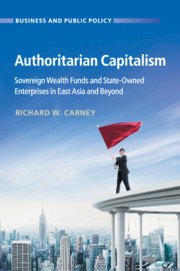Description
Authoritarian Capitalism
Sovereign Wealth Funds and State-Owned Enterprises in East Asia and Beyond
Business and Public Policy Series
Author: Carney Richard W.
The liberal-democratic world order is confronting the rise of authoritarian state-led corporate interventions. This book explains how and why.
Language: English
Subject for Authoritarian Capitalism:
Authoritarian Capitalism
Publication date: 01-2019
Support: Print on demand
Publication date: 01-2019
Support: Print on demand
Authoritarian Capitalism
Publication date: 04-2018
Support: Print on demand
Publication date: 04-2018
Support: Print on demand
Description
/li>Contents
/li>Biography
/li>
Since 1945, the liberal-democratic model of capitalism spread across the globe, ultimately prevailing over communism. Over the past two decades, a new statist-authoritarian model has begun diffusing across East Asia. Rather than rejecting capitalism, authoritarian leaders harness it to uphold their rule. Based on extensive research of East Asia's largest corporations and sovereign wealth funds, this book argues that the most aggressive version of this model does not belong to China. Rather, it can be found in Malaysia and Singapore. Although these countries are small, the implications are profound because one-third of all countries in the world possess the same type of regime. With an increasing number of these authoritarian regimes establishing sovereign wealth funds, their ability to intervene in the corporate sectors of other countries is rapidly expanding.
1. Introduction; 2. Theory; 3. Global patterns; 4. East Asia patterns; 5. Narrow authoritarian regime: Brunei; Single party authoritarian regime: China; From single party authoritarian regime to democracy: Taiwan; 6. Dominant party authoritarian regime with a weakly dominant ruling party: Malaysia; 7. Dominant party authoritarian regime with a strongly dominant ruling party: Singapore; 8. Conclusions.
Richard W. Carney is a faculty member of the China Europe International Business School (CEIBS). His articles have appeared in journals such as the Journal of Financial Economics, Business and Politics, and the Review of International Political Economy. He is also the author of Contested Capitalism: The Political Origins of Financial Systems (2009) and editor of Lessons from the Asian Financial Crisis (2011). Prior to CEIBS, he held faculty positions at the Australian National University, Canberra and the Nanyang Technological University, Singapore. He has extensive experience speaking to executives and government officials from across Asia, North America, Europe, and Australia.
© 2024 LAVOISIER S.A.S.




